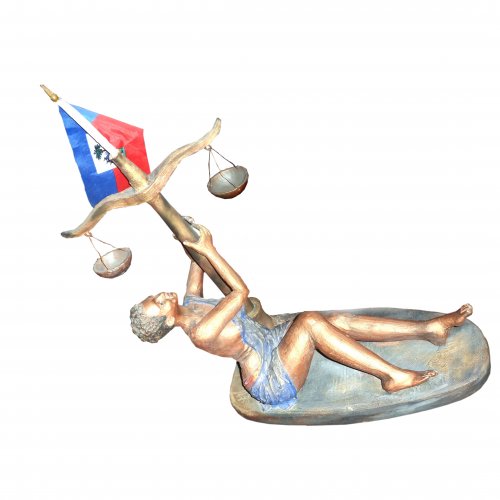Best Financial Services Regulation Lawyers in Haiti
Share your needs with us, get contacted by law firms.
Free. Takes 2 min.
Or refine your search by selecting a city:
List of the best lawyers in Haiti
About Financial Services Regulation Law in Haiti
Financial Services Regulation in Haiti is governed by a set of laws and guidelines that are designed to maintain the integrity, stability, and resilience of the financial system. The regulatory framework aims to protect consumers, ensure fair competition, and prevent financial crimes such as money laundering and fraud. These regulations are implemented by various government bodies, including the Central Bank of Haiti (Banque de la République d'Haïti, BRH), which plays a pivotal role in supervising banking activities, setting monetary policies, and providing financial stability in the country.
Why You May Need a Lawyer
There are several situations where individuals or businesses may require legal advice in the field of Financial Services Regulation. For example, if you are starting a financial institution or fintech company, you will need to navigate the registration and licensing process to ensure compliance with local laws. Businesses involved in money transfer services or operating as a foreign financial entity must adhere to specific regulatory requirements. Moreover, individuals involved in litigation concerning financial disputes, fraud allegations, or bankruptcy cases might seek expertise from a financial services lawyer to defend their rights and interests.
Local Laws Overview
Haiti's financial services regulatory framework involves several key pieces of legislation that are particularly relevant. The Central Bank plays an integral role in regulating commercial banks, while other sectors such as insurance and securities are subjected to distinct regulatory regimes. Key aspects include strict anti-money laundering (AML) regulations, requirements for financial reporting, and consumer protection laws. Understanding these laws is essential for entities operating within Haiti's financial sector to safeguard against legal penalties and ensure smooth operations.
Frequently Asked Questions
What are the primary bodies responsible for financial services regulation in Haiti?
The Central Bank of Haiti (BRH) is the principal regulator, with additional oversight provided by ministries like the Ministry of Economy and Finance.
What licenses are required to operate a financial services business in Haiti?
Depending on the type of business, you may need a banking license, money transfer operator license, or other specific permits as regulated by the BRH.
How does Haiti address anti-money laundering (AML) concerns?
Haiti has implemented comprehensive AML laws to detect and prevent money laundering and terrorism financing, requiring financial institutions to comply with reporting and due diligence obligations.
Are there consumer protection laws specific to financial services in Haiti?
Yes, consumer protection laws exist to ensure fair treatment, transparency, and accountability in financial services, providing mechanisms for dispute resolution.
How are foreign financial institutions regulated in Haiti?
Foreign financial institutions must comply with local regulations, including gaining approval from the BRH and adhering to the same standards as domestic institutions.
What are the penalties for non-compliance with financial regulations in Haiti?
Penalties may include fines, suspension of licenses, or legal action depending on the severity of the non-compliance and the specific regulations violated.
Is digital currency usage regulated in Haiti?
Digital currencies are not widely regulated yet, but the BRH may issue future guidelines as the digital economy evolves.
How can individuals report suspicious financial activities?
Individuals or entities can report suspicious activities to the relevant authorities such as the Financial Intelligence Unit (Unité Centrale de Renseignements Financiers - UCREF).
What rights do consumers have in financial disputes?
Consumers have the right to fair treatment and can seek resolution through legal channels or consumer protection agencies if disputes arise.
How does Haiti's financial regulation compare internationally?
While Haiti is working towards aligning with international standards, the regulatory framework is still developing, focusing on core issues like AML and consumer protection.
Additional Resources
Those seeking further assistance can refer to the Central Bank of Haiti or the Ministry of Economy and Finance for official regulations and guidance. The Financial Intelligence Unit (UCREF) is an important resource for understanding AML requirements. Additionally, local legal firms specializing in financial services regulation can provide bespoke advice and representation.
Next Steps
If you require legal assistance in Financial Services Regulation, consider consulting a lawyer with expertise in Haitian financial laws. Begin by identifying your specific needs and gathering all relevant documentation. Contact a recommended local legal firm or the Haitian Bar Association to find qualified professionals. Remember, staying informed and proactive in regulatory compliance will help shield you from potential legal issues in the future.
Lawzana helps you find the best lawyers and law firms in Haiti through a curated and pre-screened list of qualified legal professionals. Our platform offers rankings and detailed profiles of attorneys and law firms, allowing you to compare based on practice areas, including Financial Services Regulation, experience, and client feedback.
Each profile includes a description of the firm's areas of practice, client reviews, team members and partners, year of establishment, spoken languages, office locations, contact information, social media presence, and any published articles or resources. Most firms on our platform speak English and are experienced in both local and international legal matters.
Get a quote from top-rated law firms in Haiti — quickly, securely, and without unnecessary hassle.
Disclaimer:
The information provided on this page is for general informational purposes only and does not constitute legal advice. While we strive to ensure the accuracy and relevance of the content, legal information may change over time, and interpretations of the law can vary. You should always consult with a qualified legal professional for advice specific to your situation.
We disclaim all liability for actions taken or not taken based on the content of this page. If you believe any information is incorrect or outdated, please contact us, and we will review and update it where appropriate.
Browse financial services regulation law firms by city in Haiti
Refine your search by selecting a city.








